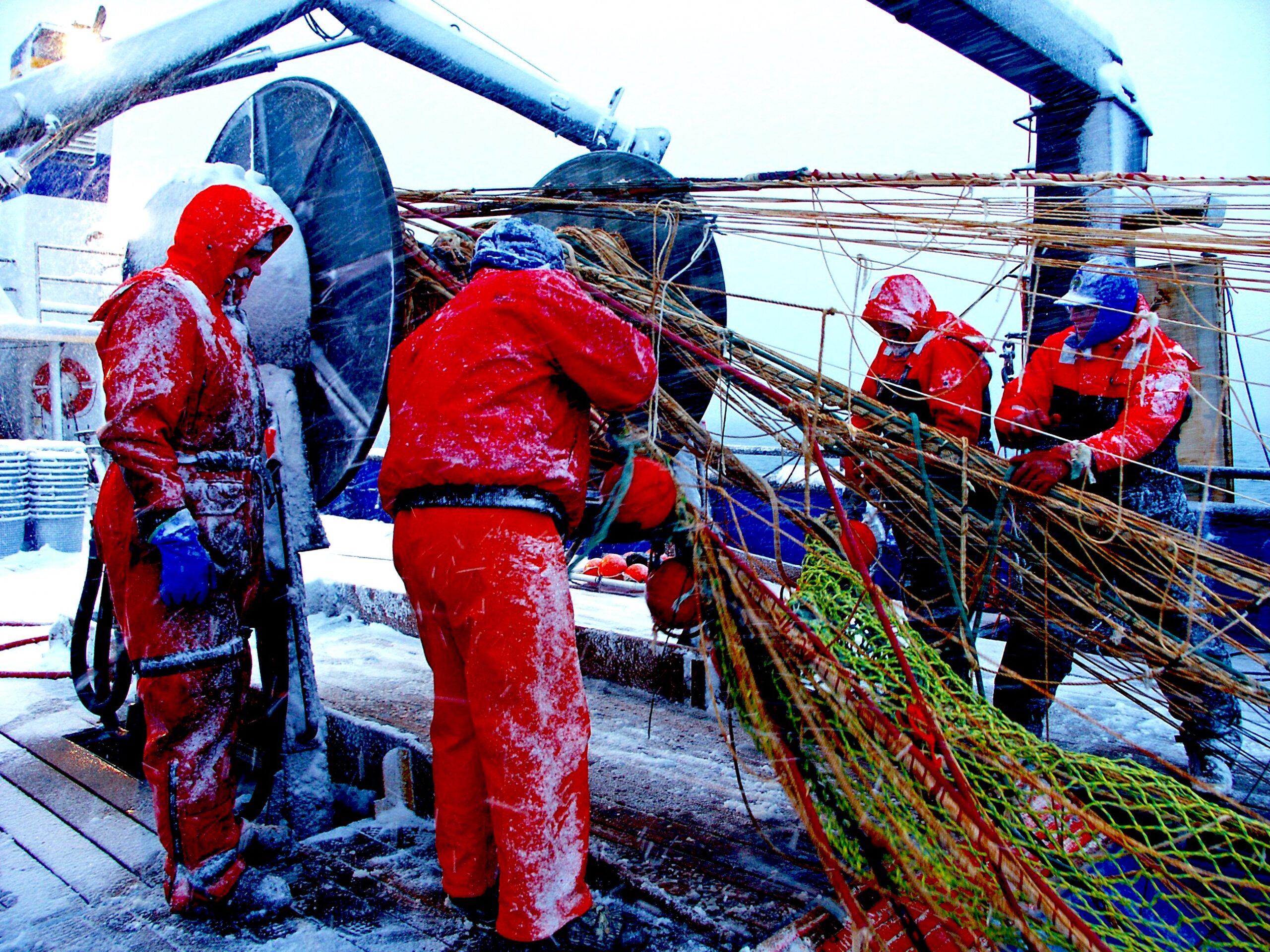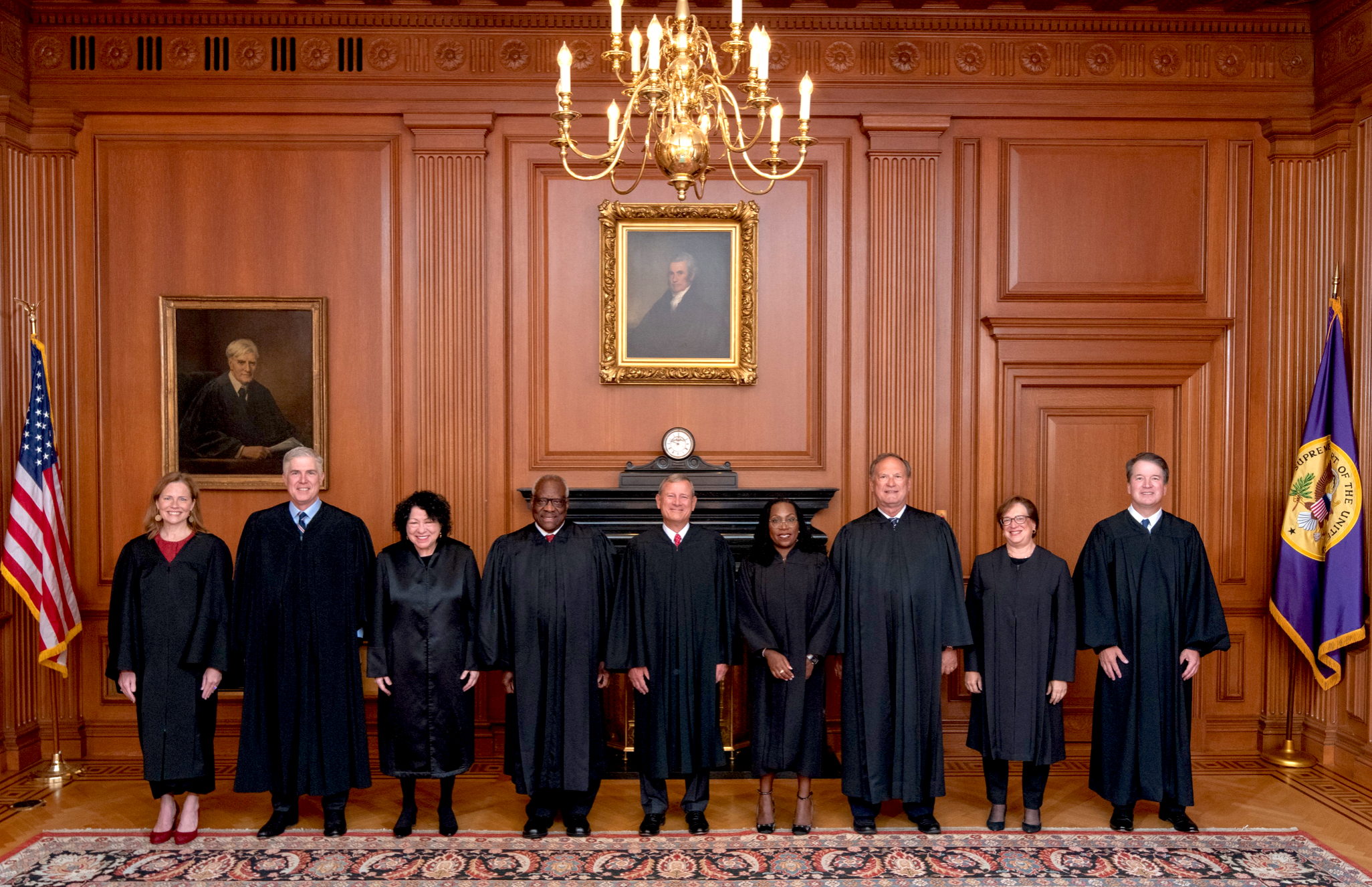Overturning the “Chevron deference” could imperil Americans’ health, safety, labor, air, water, food and environmental protections, writes Marjorie Cohn.

National Marine Fisheries Service conducts a trawl during a winter snow storm to survey herring population in Alaska, 2005. (NOAA/NMFS/AKFSC/Auke Bay Lab)
 In an ominous but unsurprising development, the Supreme Court has agreed to hear a case that may well imperil Americans’ health, safety, labor, clean air and water, food and environmental protections. On May 1, the court decided to reconsider its 40-year-old precedent in the current case of Loper Bright Enterprises v. Raimondo.
In an ominous but unsurprising development, the Supreme Court has agreed to hear a case that may well imperil Americans’ health, safety, labor, clean air and water, food and environmental protections. On May 1, the court decided to reconsider its 40-year-old precedent in the current case of Loper Bright Enterprises v. Raimondo.
This right-wing court, which demonstrated its disregard for legal precedent when it overruled Roe v. Wade, may now overturn the well-settled “Chevron deference.” Doing so would be consistent with the conservative fealty to deregulation in order to protect corporate profits.
Chevron deference was created in the 1984 case of Chevron v. Natural Resources Defense Council. It requires that when a law is silent or ambiguous on a certain matter, courts must defer to a federal regulatory agency’s construction of the statute if it is reasonable.
“With regard to judicial review of an agency’s construction of the statute which it administers, if Congress has not directly spoken to the precise question at issue, the question for the court is whether the agency’s answer is based on a permissible construction of the statute,” John Paul Stevens wrote for the unanimous court.
Courts have used Chevron deference to:
- Uphold the National Labor Relations Board’s decision that live-haul workers are employees entitled to protections of the National Labor Relations Act;
- Sustain the Environmental Protection Agency’s (EPA) rule that requires states to reduce emissions from power plants that travel across state lines and harm downwind states;
- Affirm the Department of Labor’s interpretation of portions of the Black Lung Benefits Act that enable coal miners afflicted with black lung disease to receive compensation; and
- Accept the EPA’s revision of regulations under the Toxic Substances Control Act to provide additional protection from exposure to lead paint.
If the high court overrules Chevron, judges would be free to strike down regulations enacted by agencies such as the National Labor Relations Board, the Environmental Protection Agency and the Department of Labor. Right-wing judges could overturn regulations that benefit workers or limit climate change.
Chevron, which has been cited in more than 19,000 judicial opinions, is one of the most-cited decisions in the federal courts.
The Loper Bright Case

The Roberts Court, from left: Amy Coney Barrett, Neil Gorsuch, Sonia Sotomayor, Clarence Thomas, Chief Justice John Roberts, Ketanji Brown Jackson, Samuel Alito, Elena Kagan and Brett Kavanaugh. (SCOTUS, Public Domain)
In Loper Bright, a divided panel of the D.C. Circuit Court of Appeals relied on Chevron to reject the commercial fishing companies’ challenge to a rule promulgated by the National Marine Fisheries Service (NMFS). The rule requires the fishing industry to pay the costs of observers who monitor compliance with fishing management plans to prevent overfishing.
Although the statute says the government can require fishing boats to carry monitors, it does not indicate who must pay for them. The appellate court held in Loper Bright that the fisheries service’s interpretation that the federal fishery law authorized the industry to fund the monitors was reasonable, so the court should defer to the NMFS’s interpretation.
Citing Chevron, the appellate opinion says, “When Congress has not ‘directly spoken to the precise question at issue,’ the agency may fill this gap with a reasonable interpretation of the statutory text.”
The fishing companies appealed the court of appeals’ ruling to the Supreme Court. The high court agreed to 1) consider whether to overrule Chevron, or 2) clarify whether when a law is silent about “controversial powers expressly but narrowly granted elsewhere in the statute,” there is no ambiguity in the statute, so no deference is necessary.
“Chevron, which has been cited in more than 19,000 judicial opinions, is one of the most-cited decisions in the federal courts.”
In order to grant certiorari (review the case), four members of the Supreme Court must agree. If the four who voted to grant cert in Loper Bright are joined by a fifth member in voting for reversal, they could overrule the Chevron case.
Chevron deference has been the law of the land for nearly 40 years. But the judges in the conservative super-majority on the current Supreme Court have cavalierly overturned the court’s own precedents and ignored stare decisis (legal precedent) when it suits their pro-business and religious interests.
U.S. Solicitor General Elizabeth Prelogar wrote in a brief on behalf of the Biden administration that the fishing companies “have not carried their burden of demonstrating any special justification that could plausibly warrant such a departure from stare decisis principles, and this case would be an unsuitable vehicle for reconsidering Chevron in any event.”

Justice Neil Gorsuch in 2017. (U.S. Marine Corps/Christian Varney)
Neil Gorsuch has long sought to overturn Chevron. Dissenting in TransAm Trucking v. Alphonse Maddin in 2016, when he was a judge on the Tenth Circuit Court of Appeals, Gorsuch refused to apply Chevron deference. He callously ruled in favor of an employer who ordered a trucker exhibiting signs of hypothermia to drag a trailer that had no brakes or stay put and risk freezing to death.
In his 2016 concurrence in Gutierrez-Brizuela v. Lynch, Gorsuch indicated that Chevron deference should be reconsidered: “Maybe the time has come to face the behemoth,” he wrote. Gorsuch’s record seems to indicate he would readily substitute his own interpretation rather than defer to agencies that are in the best position to make determinations within their purview.
“Gorsuch’s record seems to indicate he would readily substitute his own interpretation rather than defer to agencies that are in the best position to make determinations within their purview.”
After Gorsuch was nominated to the Supreme Court, the nonprofit organization Alliance for Justice warned about the dangers of courts second-guessing agency experts:
“It is difficult to overstate the damage [Gorsuch’s] position would cause. Judge Gorsuch would tie the hands of precisely those entities that Congress has recognized have the depth and experience to enforce critical laws, safeguard essential protections, and ensure the safety of the American people.”
Moreover, last year, Gorsuch dissented from a denial of review, arguing that the court “should acknowledge forthrightly that Chevron did not undo, and could not have undone, the judicial duty to provide an independent judgment of the law’s meaning in the cases that come before the Nation’s courts.”
Clarence Thomas also opposes Chevron deference. Although he once favored it, Thomas changed his tune after his wife Ginni accepted secret money from a right-wing network. In 2015, Thomas argued in a concurring opinion that Chevron deference “wrests from Courts the ultimate interpretative authority ‘to say what the law is,’ and hands it over to” the executive branch.
Brett Kavanaugh opposes Chevron deference as well. While John Roberts and Samuel Alito have criticized the doctrine, they have not called for overruling it. Amy Coney Barrett has not yet opined on the issue.
Ketanji Brown Jackson, who participated in Loper Bright when she was a judge on the D.C. Circuit, has recused herself from the case in the Supreme Court.
‘Judicial Power Grab’
Chevron deference to federal agencies ensures that the authority resides in the executive branch which is accountable to the electorate, as opposed to the unelected, unaccountable judicial branch.
Former Supreme Court Associate Justice Stephen Breyer said that ending Chevron deference to agencies would be a “judicial power grab.”
“Chevron deference to federal agencies ensures that the authority resides in the executive branch which is accountable to the electorate, as opposed to the unelected, unaccountable judicial branch.”
If the court overturns or severely limits Chevron deference, it will be easier for businesses to challenge regulations throughout the economy. “By centralizing interpretive decisions in agencies supervised by the President, Chevron also promotes political accountability, national uniformity, and predictability, and it respects the expertise agencies can bring to bear in administering complex statutory schemes,” Solicitor General Prelogar wrote.
When it recently invoked the “major questions doctrine” for the first time, the court took a significant step toward overruling Chevron. The major questions doctrine allows five judges on the Supreme Court to cancel acts by federal agencies that involve “decisions of vast economic and political significance.” The court’s six-member supermajority used the major questions doctrine to strike down a proposal by the Environmental Protection Agency to limit carbon emissions from power plants.
The Supreme Court will consider Loper Bright during its 2023-2024 term and issue a decision in June or July of 2024.
Marjorie Cohn is professor emerita at Thomas Jefferson School of Law, former president of the National Lawyers Guild, and a member of the national advisory boards of Assange Defense and Veterans For Peace, and the bureau of the International Association of Democratic Lawyers. Her books include Drones and Targeted Killing: Legal, Moral and Geopolitical Issues. She is co-host of “Law and Disorder” radio.
This article is from Truthout and reprinted with permission.
The views expressed are solely those of the author and may or may not reflect those of Consortium News.
Support CN’s Spring
Fund Drive Today


While the article notes the valid cases of resting regulatory interpretation in executive agencies, there are important cases where that does not work, notably the secret agencies which claim absolute discretion.
We cannot assume that executive agencies are willing to prevent executive overreach.
While regulatory agencies have necessary domain knowledge and often neutrality in interpretation, their decisions should be subject to review where there is evidence of impropriety including political bias.
They refrain from overreach where it would cause a public outcry, but not where it can be concealed.
An example is my case against the DOJ, FBI and HSI for refusing to investigate political racketeering.
They investigated a Democratic candidate in FL for 6 years for alleged mishandling of $125,000.
But refused even to reply to my seven notices to each of their local, state, HQ and OIG offices of theft of $120 million by Republican politicians there, complete with full evidence, during both Trump and Biden administrations. They were in full collusion with massive theft by political racketeers.
When the case went to the DC district, the judge was the same who had moved from the FISA court after granting over a thousand warrants to the FBI and HSI without any evidence against the accused. After granting them six months extra to file an Answer, they refused to do so and demanded dismissal claimng absolute discretion in what they investigate, as well as absolute immunity from responsibility for collusion with criminals. The crooked judge granted that and it went to appeal in the same DC Circuit involved here.
The problem is that we do not have a judiciary or secret agencies willing to serve the people.
The judiciary is absolutely crooked to the very top, mere operatives of political party racketeers.
The secret agencies are crooked to the top level and OIGs, serving only political party racketeers.
Consider that both the Democrats and the Republicans are very happy with Japan dumping the radioactive water from Fukushima into the Pacific Ocean … with the same old tale … its a big ocean, it won’t make any difference. Even if someone from either gang thought privately that this was a bad idea, they are in bi-partisan unity in the belief that this is just a minor side issue compared to their bi-partisan war against China.
But it is definitely getting to be the time to say “So long, and thanks for all the fish”
Welcome to the 2024 Vote for More of the Same Campaign.
The Democrats were willing let the Republicans stack the court with partisan hacks. I don’t remember any serious fights to stop them, just the usual statements and press conferences and other hot air. That is the known history. Then what you see is that the Democrats then only use this to campaign for keeping them in power. They can’t say “Vote for more of the same, because the last four years have been so incredibly wonderful”, so instead they say “Be Very Afraid, so Vote for Fore More of the Same.”
“Four More Years!”, says the Committee to RE-Elect the President (CREEP).
If you think Biden is upset by any of what is reported, remember that he keeps repeating like a mantra “America needs a strong Republican Party.” He has said this many more times than he has tried to fix the stolen court. I don’ know how many times he’s said it, but I know that it is more than the zero times he has tried to fix the steal of the court. Its not like the former Senator from MasterCard has any real problems with slashing worker and consumer rights. I’m guessing that Hunter is reporting that this is good for the balance in the family hedge fund.
No one can deny that the oceans of the world are disastrously overfished. The last fishing trip I took off the coast of Maine and New Hampshire in 2021 proved to me that overfishing has destroyed this global source of fresh, nutritious food. A full day of 15 people fishing in deep waters yielded one single haddock and a gaggle of puny Redfish. Over my entire life, the same area had always provided more fish than we could consume after a day’s fishing. The last two times I ordered fish in two reputable restaurants, I found a large parasite worm that had been cooked in. The few remaining edible fish in the ocean are diseased and dying. Unlike ‘climate change,’ which can be endlessly debated, there can be no debate about the fact that fish resources have been depleted to near extinction. The result of massive factory ships that gather every form of marine life up and destroy anything they can’t profit from. The problem would go away if we merely agreed internationally to outlaw factory fishing. A personal rant about a U.S. Supreme Court that leans conservative does nothing to solve this global problem. If the U.S. government wants to assign blame to small fishing boat owners for the greed of the larger corporate ships, they should produce the funds to pay for their cynical sideshow subterfuge. The U.N. could be used to solve actual problems like overfishing. Instead they waste their time on endless debates that help no one but further inflame petty political divisions.
As if regulatory capture isn’t enough of a problem already, now comes potential for removal of serious application of laws for protecting public health, safety & environment & not just to help big bidness.
And the corporate court won’t be satisfied until they’ve instituted a totally canine, barking mad society, ie. dog eat dog & divvil take the hindmost.
But wait, up in the sky, is it a bird? Is it a plane? Could it be the third leg of our crooked, three-legged stool of governance hobbling to the rescue? To make the laws extra tight & to make clear the authorities invested in protection of the commonweal? (Made you laugh)
What would you do, if you were king, you ask? Scrape all slates clean. All incumbents out now. Rinse & repeat, over & over & over, ‘til the elected begin to act on behalf of the least not for those with the most.
Where’s Spock? This may take some fancy Martian mind meld thing.
Amanpour & Co. has just posted a video by Stephan Vladeck J.D. during which he expounds on the present SCOTUS and the machinations taking place there since at least 2017.
This gentleman makes some very serious sense and a case for action to be taken against some recent SCOTUS activities concerning the “shadow docket”, cases that are decided very quickly, without written opinions or oral arguments.
Find it watch it or you lose out! It runs 18+ minutes great stuff from a smart guy!
Thanks CN
Deregulation has wrought the libertarian paradise we currently enjoy.
And Mr. Powers you also have used one sentence to hit the second one out!
Marjorie Cohn has called just as she sees it and hit it out of the park here, calling this SCOTUS action “A judicial Power Grab”.
American workers flat on the faces after this last round of inflation are already without a voice in D.C. and face annihilation currently, this court rules in favor of overturning “Chevron deference, and it’s all over.
This court seems very determined to gut the country from within. Very similar to the obstructionist two-party system engaged in very similar activity. See the republican party of “No” and the democratic party of “Do nothing” and realize doing the business of the American Public is no longer of any interest to congress.
The Deep State has taken the U.S. over by way of creating an essentially authoritarian government by subterfuge, using the paid lobbyist system that has ruined the country.